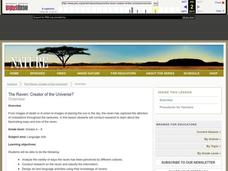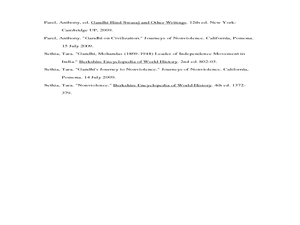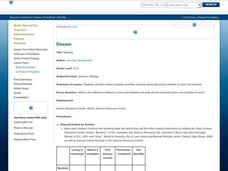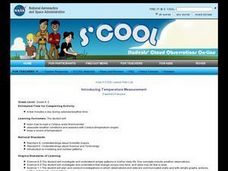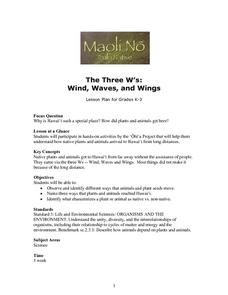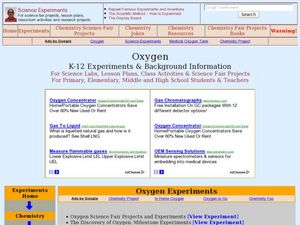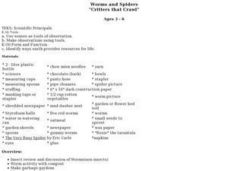Curated OER
Bluebirds
Students use the internet to gather information on bluebirds. In groups, they observe and record the size, color and various sounds of the birds. They view photographs of the birds in different stages of development and discuss how...
Curated OER
How a Seed Grows: And Who Grows It
Second graders explore botany by viewing video clips in class. In this seed growth lesson, 2nd graders identify the types of seeds that grow specific plants and what the optimal conditions are for growing seeds. Students view a video...
Curated OER
How Does Whale Blubber Work?
Students perform an experiment to find out how whale blubber keeps whales warm in cold temperatures. They use Ziploc bags lathered in shortening to simulate whale blubber. They put their hands in cold water, both with and without the bags.
Curated OER
Bean There, Done Plant
Students explain that events in nature follow an orderly progression when they plant seeds and observe the development of the seeds. They count seeds and find the likenesses and the differences of many seeds.
Curated OER
Don't Use it All Up
Students observe the way that a sponge absorbs liquids and discuss how we our use of natural resources affects the environment around us. They discuss the need to conserve resources so we don't run out of what we need.
Curated OER
The Raven: Creator of the Universe?
Students explore biology by researching birds in class. In this raven identification instructional activity, students utilize the Internet to identify the anatomy, habits and habitat of ravens. Students write descriptive paragraphs about...
Curated OER
Hopi Agriculture
Students discuss the farming practices of the past and present of the Hopi people and discuss the importance of corn. In this Hopi agriculture lesson plan, students also plant their own seeds of corn.
Curated OER
Children's Literature Across the Curriculum Ideas-Polar, The Titanic Bear
Students read Polar, The Titanic Bear by Daisy Corning Stone Spedden. They complete a variety of cross-curricular activities surrounding this true story of a toy bear that survived the sinking of the Titanic. Included are reading, art,...
Curated OER
Nonviolence and Conflict: Its Importance to Building Community
Young scholars study nonviolence and the values associated with nonviolence. In this social science lesson, students identify the six steps of nonviolence and the six principles of nonviolence as put forth by Martin Luther King, Jr....
Curated OER
Do You See What I See?
Students hypothesize the role of rocks, soil, and water by observing a terrarium and create a model to explore the water cycle. This is part of a five station set up.
Curated OER
Hey, Look Me Over!
Students make observations about mealworms using hand lenses, rulers, and cotton swabs. Students complete their own mealworm observation chart, then they share their observations with the class. This is one station out of five in an...
Curated OER
Bugsicles (A Frozen Insect Larva You can Find!)
Students explore how animals survive in the winder. After attending a gall-collecting field trip, students place them in a freezer. Once frozen, the students open the gall flay larva and observe it as the larva revives. Students...
Curated OER
Disease
High schoolers study the differences between viruses and bacteria. They educate others to the harms and benefits of each by making a newspaper ad, pamphlet or informative article.
Curated OER
Introducing Temperature Measurement
Students explore temperature and use Celcius thermometers to measure and graph the temperature in the classroom daily. They estimate what they think the temperature might be and then find the actual temperature in the room.
Curated OER
Dinosaurs - Online Research
Second graders familiarize themselves with dinosaurs through online research.
Curated OER
Factors Affecting Plant Growth
Students determine the physical and chemical factors that affect plant growth. In this biology activity, students explain the role of hormones in plants. They investigate how competition with other plants affect their growth.
Curated OER
The Three W's: Wind, Waves, and Wings
Students participate in hands-on acticities to understand how native plants and animals arrived on Hawaii from long distances without the assistance of man. They then identify what characterizes a plant or animal as native vs. non-native.
Curated OER
Oxygen
Young scholars explore oxygen and its physical and chemical propeties. In this investigative lesson students complete several experiments using oxygen.
Curated OER
Electrifying the World
Students explore the fundamental concepts of electricity. They examine different circuit diagrams to study how electricity flows. They finish by creating their own simple circuit.
Curated OER
Drifting Continents
Students, through teacher-led demonstration, explore the idea of continental drift. They complete a worksheet involving the calculation of continental drift over time.
Curated OER
Fungus
Learners study fungus, its reproduction and uses. For this eukaryote lesson students complete several fungal experiments.
Curated OER
Pet Overpopulation
Students identify the needs of animals. In this animal welfare lesson plan, students read the article "If This Cat Could Wish" and identify the needs of animals. Students color in a coloring sheet of a cat.
Curated OER
Worms and Spiders: "Critters That Crawl"
Pupils complete a unit of lessons on spiders and worms. They discuss worm and spider characteristics, create a garbage garden, observe worms, create gummy worm prints, read the book, 'The Very Busy Spider,' and construct a spider and...
Curated OER
How Does a Green Plant Grow?
Students examine how a seed grows, and design an experiment to explore this concept. They make predictions, conduct the experiment, record the results, and interpret the results.
Other popular searches
- K 2 Life Science Growth
- K 2 Life Science Living
- K 2 Life Science Insects
- K 2 Life Science Salamander
- K 2 Life Science Hibernation
- K 2 Life Science Adaptation
- K 2 Life Science Cells
- K 2 Life Science Nonliving
- K 2 Life Science Wind







